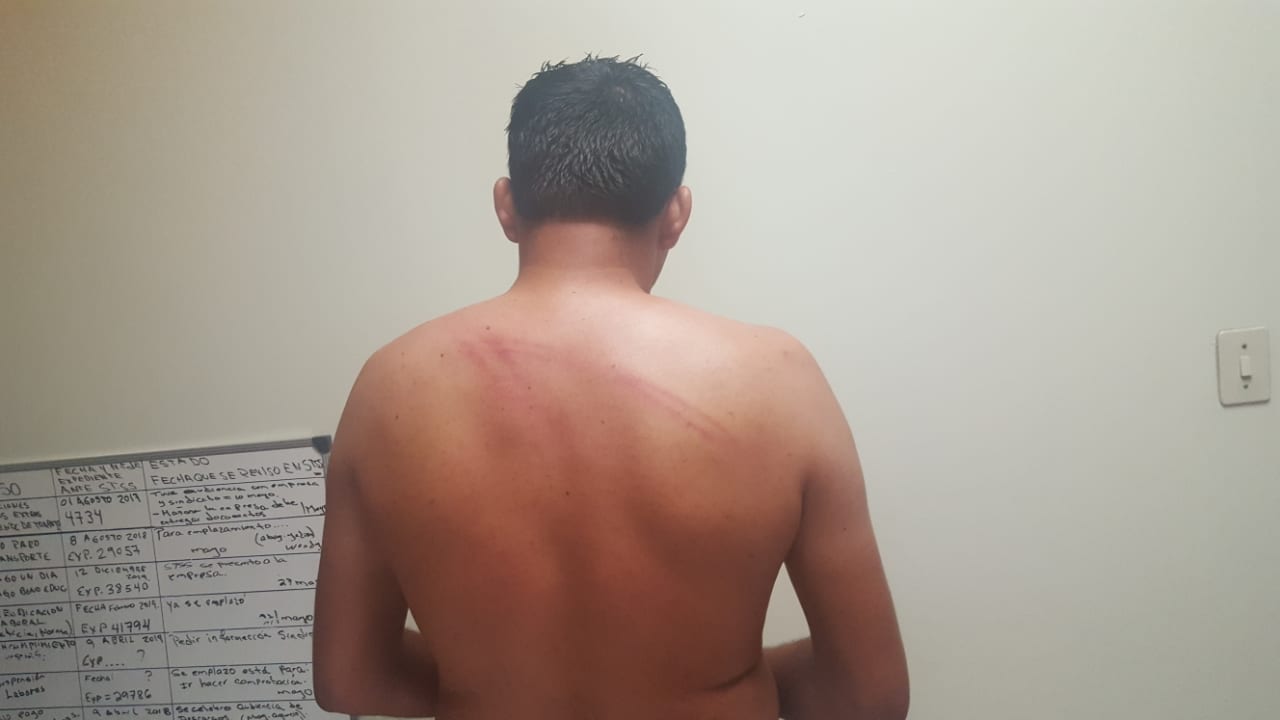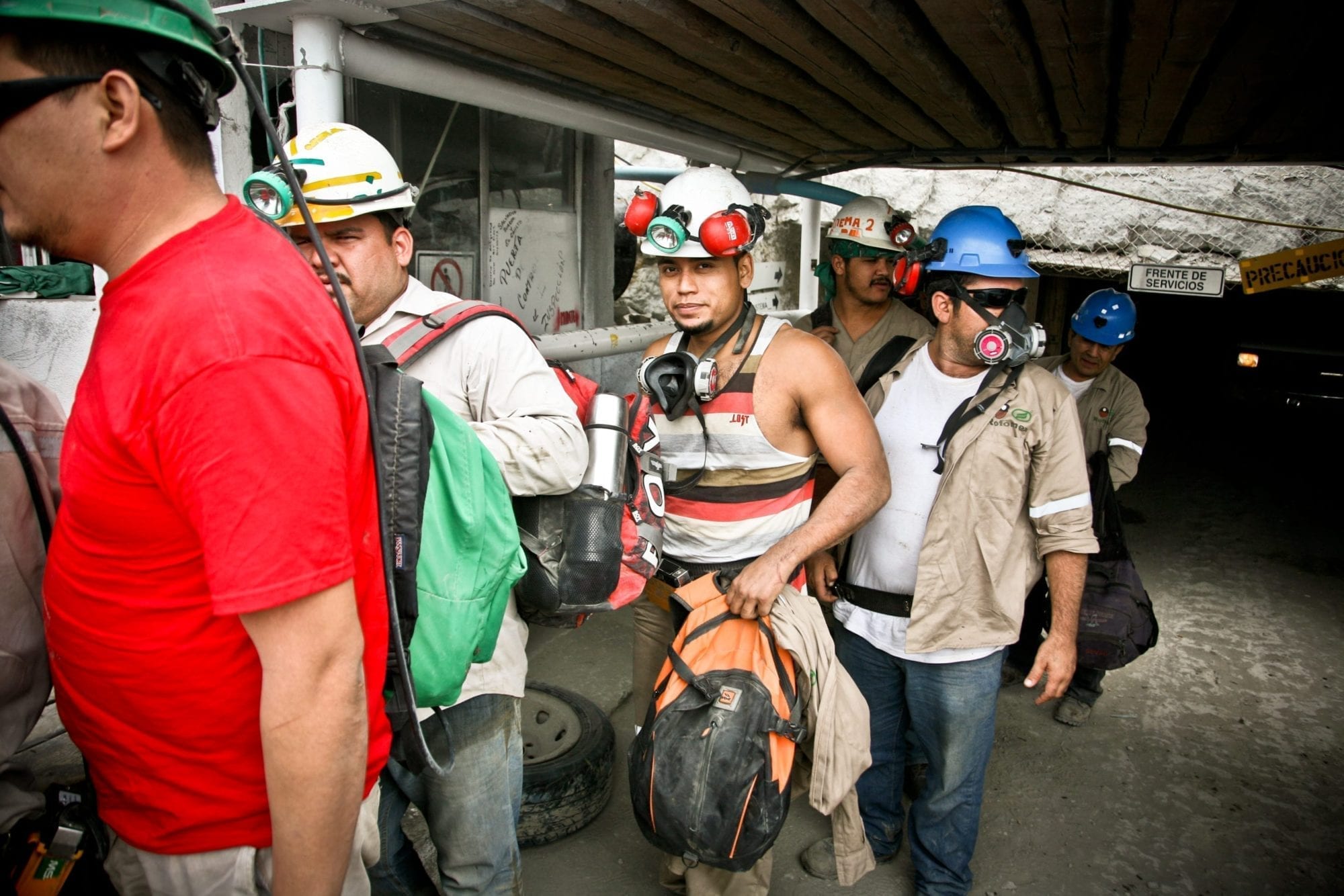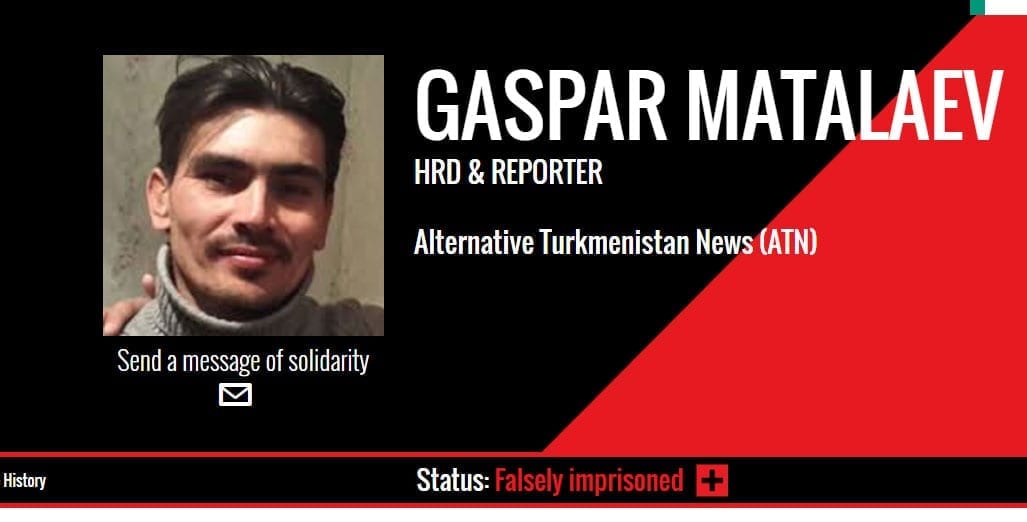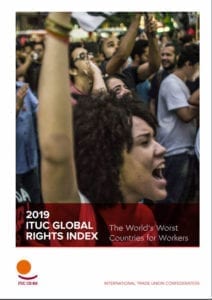
Jul 1, 2019
One union activist from the Workers’ Union of the Gildan Villanueva S.A. (SITRAGAVSA) was murdered and at least three others attacked during recent protests against the Honduran government’s efforts to privatize the country’s education and health systems, according to an independent human rights monitor, who will not be identified out of safety concerns.
The Platform for the Defense of Health and Public Education, a coalition of union and community organizations, led protests across the country in May and June. Security forces repeatedly responded by firing at protesters with live ammunition and tear gas.
Joshua Sánchez, 22, a union member, was shot in the head by police during protests in Villanueva after he sought refuge in a shop (see video), according to witnesses interviewed by the human rights monitor. Sanchez leaves behind a 4-year-old son.

Abel Martel received head wounds from assault by Honduran national police.
Among union leaders wounded, Nahún Rodríguez, president of SITRAGAVSA, was assaulted and threatened by a military policeman during protests in Villanueva, according to the human rights monitor. Abel Martel, SITRAGAVSA secretary general, was assaulted by national police and union delegate Skeyla Suyapa Gomez received a face wound from a tear gas bomb dropped by the national police. The union leaders, workers at apparel factories, joined thousands of teachers and health care workers in solidarity with their struggle and to demonstrate the importance of maintaining quality public services for all Hondurans.
Spending on education and culture has dropped from 33 percent of the national budget to 20 percent over the past decade, with wages and infrastructure spending frozen. Some 40 percent of emergency rooms have inadequate medical coverage, according to the Honduras National Commission for Human Rights. Educators and health care workers say privatizing health and education systems will further decrease services and lead to layoffs.
Few Perpetrators Brought to Justice Despite Global Condemnation
The Network Against Anti-Union Violence in Honduras, which each year issues a report documenting violence against and murders of Honduran union leaders and members, is among local and international organizations denouncing the deadly crackdown. Yet despite widespread global condemnation, union leaders and members continue to be targeted, and few, if any, perpetrators are brought to justice.
The International Labor Organization this month issued its second complaint against the Honduran government in as many years over the continuing attacks on union activists, indicating its serious concern regarding “the allegations of acts of anti-union violence, including the allegations of physical aggression and murders, and the prevalent climate of impunity.”
In 2012, the AFL-CIO and 26 Honduran unions and civil society organizations filed a complaint under the labor chapter of Central American Free Trade Agreement (CAFTA). The complaint, filed with the U.S. Department of Labor’s Office of Trade and Labor Affairs, alleges the Honduran government failed to enforce worker rights under its labor laws. In a February 2015 report, the U.S. Trade and Labor Affairs office said Honduras had made virtually no progress since 2012.

Jun 27, 2019
Mexico’s stubbornly low wages and its complex industrial-relations system that denies workers their right to freedom of association and robs them of the ability to demand better wages and working conditions were front and center at a House Ways and Means subcommittee hearing on Mexican labor reform yesterday in Washington, D.C. A representative of the Solidarity Center and other rights and trade experts testified.
Gladys Cisneros, Solidarity Center country program director in Mexico, told members of the subcommittee on trade that Mexico’s new labor law is a good first step, but implementation will be a challenge and strong monitoring of worker rights are essential for it to succeed. Mexico passed labor law reform in April to improve workers’ ability to freely form unions of their choice and have more control over collective bargaining contracts.
Mexico has a long history of suppressing worker rights. Workers face daunting obstacles when challenging the “protection union” system, in which secret employer “protection contracts,” negotiated between a non-democratic union and a complicit employer without the knowledge of the workers, are widespread. Independent unions rarely succeed in defeating protection unions that have historical presence, political ties and financial capacity to exert influence over workers.
In her written testimony, Cisneros estimates that “only 1 percent to 2 percent of Mexican workers are members of an independent trade union, and just 1 percent of Mexico’s workers are covered by authentic collective bargaining agreements that were reviewed and ratified by workers.
“When workers decide to organize a new independent union, it is not uncommon for an employer to announce that the workplace is already covered by an agreement and that the workers already have a (protection) union. If no protection union is in place, employers can quickly find one to sign a contract and thwart the independent organizing effort,” Cisneros said in the written testimony.
She said that ousting protection unions is extremely difficult and that shifts both cultural and in approach are required to implement labor reforms. The new labor law already is being challenged by deeply entrenched protection unions and employers, Cisneros said.
Workers Key to Mexico’s Labor Law Success
Cisneros stressed the role of workers in implementing the labor law reform.
“For the reform to succeed, workers must be placed at the center of implementation. They must be sufficiently knowledgeable and empowered and given concrete guarantees that their attempts to exercise these newly enshrined rights will not be met by the usual responses from employers and government. Only when workers, through their efforts in the workplace, can exercise and invoke these new laws will the legal changes be made real and reach their potential to improve working conditions and wages,” she said.
Cisneros described cases in which workers freedom of association was violated and said that while the new labor law is designed to first weed out sham contracts and ghost unions, they then must be replaced with authentic unions led by workers. Mexico’s independent labor movement is already stretching its limited financial resources, political capital and capacity for mere survival.
Cisneros also recommended that workers must be positioned to imagine new possibilities and develop new expectations if they are to invoke the new legal framework and serve as the agents to apply these changes.
The reform speaks to the persistent, dire lack of democracy in labor relations and the inability of workers, in most cases, to freely choose their representation and effectively negotiate their terms of employment, she said.
Also testifying were AFL-CIO International Department Director Cathy Feingold, University of California Berkeley Center for Latin American Studies Professor Harley Shaiken and Instituto Tecnológico Autónomo de México assistant professor Joyce Sadka.

Jun 25, 2019
Belarus, Burundi, Mauritania, Russia, Saudi Arabia, South Sudan and Turkmenistan are among the 22 countries with the worst human trafficking records in 2018, according to the U.S. State Department’s annual Trafficking in Persons Report.
The report notes that for the first time, a majority of victims in 2018 were trafficked within their countries of citizenship, especially in cases of labor trafficking.
In Turkmenistan, where the government “continued to engage in large-scale mobilizations of its adult citizens for forced labor in the annual cotton harvest and in public works projects, no officials were held accountable for their role or direct complicity in trafficking crimes,” according to the report.
Further, the report states that “the continued imprisonment and abuse of an independent observer of the cotton harvest and state surveillance practices dissuaded monitoring of the harvest during the reporting period.”
Gaspar Matalaev, a labor rights activist with Turkmen.news, who monitored and reported on the systematic use of forced adult labor and child labor in Turkmenistan, remains falsely imprisoned since 2016, days after Turkmen.news published his extensive report on the country’s forced labor practices.
He has been tortured with electric shocks and held incommunicado, according to the Cotton Campaign, a coalition of organizations, including the Solidarity Center, working to end forced labor in the cotton fields. (Send a message to the Turkmenistan government to immediately release Matalaev.)
Uzbekistan, another country with vast, state-sponsored forced labor in the cotton fields, remained on the watch list, a ranking indicating more progress by the government than in Turkmenistan. Although the Uzbekistan government has made strides in ending forced labor, public-sector employees continue to be coerced into a variety of construction and municipal service work, as documented in a recent report by the Solidarity Center and the Uzbek-German Forum for Human Rights (UGF). In addition, at least 175,000 people were forced to harvest cotton in Uzbekistan’s 2018 harvest.
Migrant Workers Vulnerable to Exploitation, Trafficking
The Trafficking in Persons report also details how labor recruiters often act as human traffickers, taking advantage of migrant workers who lack information on the hiring process, are unfamiliar with legal protections and options for recourse, and often face language barriers.
“Certain unscrupulous recruitment practices known to facilitate human trafficking include worker-paid recruitment fees, misrepresentation of contract terms, contract switching, and destruction or confiscation of identity documents,” the report states.
The report continues: “Low-wage migrant laborers are extremely vulnerable to and at high risk of exploitative practices such as unsafe working conditions, unfair hiring practices, and debt bondage—a form of human trafficking.”
Each year, the State Department ranks countries in one of four tiers, basing its assessment primarily on the extent of governments’ efforts to meet the minimum standards for the elimination of human trafficking outlined in the U.S. Trafficking Victims Protection Act (TVPA). Countries at the bottom, Tier 3, fail to show they are making any effort to end human trafficking.
The State Department has issued the report annually since 2001, following passage in Congress of the TVPA in 2000.

Jun 19, 2019
The number of countries that exclude workers from the right to form or join unions increased from 92 in 2018 to 107 in 2019, and 80 percent of countries deny some or all workers collective bargaining rights, according to the International Trade Union Confederation’s Global Rights Index 2019 released today.
“Democracy is in crisis, as governments continue to roll back workers fundamental rights,” ITUC General Secretary Burrow said at a press conference releasing the report today in Geneva. “But our solidarity and defense of workers is also unprecedented.”
 The report documents escalating repressive actions against workers worldwide as part of a global environment in which democracy is being increasingly restricted.
The report documents escalating repressive actions against workers worldwide as part of a global environment in which democracy is being increasingly restricted.
In addition, the report finds:
- Union members and leaders were murdered in 10 countries: Bangladesh, Brazil, Colombia, Guatemala, Honduras, Italy, Pakistan, the Philippines, Turkey and Zimbabwe.
- 85 percent of countries have violated the right to strike.
- Workers had no or restricted access to justice in 72 percent of countries.
- Authorities impeded the registration of unions in 59 percent of countries.
- The number of countries where workers are arrested and detained increased from 59 in 2018 to 64 in 2019.
“The three global trends for workers’ rights identified in the 2019 Global Rights Index show that democracy is in crisis, governments are attempting to silence the age of anger through brutal repression, but legislative successes for workers’ rights are still being won,” the report states.
‘We Will Claim Our Rights!’
Speaking at the press conference, Bernice Coronacion, senior leader of the union federation SENTRO in the Philippines, choked up as she recounted the violent escalation against union members there, including the murder of a union leader.
“Trade union work very dangerous in the country,” she said. “We don’t just need good rights on paper for workers, we need them to be actualized. And we will claim these rights!”
The Philippines is among the 10 worst countries for workers’ rights in 2019, according to the report. The others are Algeria, Bangladesh, Brazil, Colombia, Guatemala, Kazakhstan, Saudi Arabia, Turkey and Zimbabwe.
But the report makes clear that worker rights are endangered across the spectrum: The greatest increase in the number of countries excluding workers from the right to form unions occurred in Europe, where 50 percent of countries now exclude groups of workers from the law, up from 20 percent in 2018.
Also speaking at the press conference, Vagner Freitas, president of the Central Union of Workers (CUT) in Brazil, said although the rights of women workers are being rolled back, “women have been at the forefront of the struggle against these anti-democratic actions against women workers and women in our country. We will restore democracy in Brazil.”
The ITUC Global Rights Index 2019 ranks 145 countries against 97 internationally recognized indicators to assess where workers’ rights are best protected in law and in practice. The ITUC has been collecting data on violations of workers’ rights to trade union membership and collective bargaining around the world for more than 30 years.
Read the full report.

Jun 14, 2019
In Ukraine, domestic workers formed the country’s first organization for domestic workers, including childcare workers, this week. The organization’s formation is part of a growing global movement to assert the rights of this vast, mostly hidden and primarily female workforce, as laid out in International Labor Organization (ILO) Convention 189, Decent Work for Domestic Workers.
The new Domestic Employees’ Union—formed this week to coincide with International Domestic Workers Day, celebrated on June 16 —will raise the visibility of the approximately 160,000 domestic workers providing household and personal services to families in Ukraine.
“Information and legal support for domestic workers is important,” said the founder of the organization, Layhina Tatiana, because domestic workers do not yet have formal recognition in the country. Lacking formal standing under current labor law, the Domestic Employees’ Union must operate in the country as a non-governmental organization (NGO), rather than as a formal union.
The NGO’s stated mission is to raise the visibility of domestic workers’ labor; improve their wages, work conditions and benefits; encourage the government to implement all provisions of Convention 189; provide legal services in employer disputes; and represent the rights of Ukraine’s domestic workers nationally and internationally.
“Childcare and domestic workers in Ukraine deserve the same legal recognition and rights as all other workers in the country,” said Solidarity Center’s Europe/Central Asia Director, Rudy Porter.
An estimated 67.1 million people, mostly women, provide paid domestic service around the world—both in their own countries and as migrants workers—where they clean, cook and care for children and the elderly. Domestic workers are among the most exploited and abused in the world, often working up to 18 hours a day, seven days a week, for wages far below the minimum wage. Working behind closed doors in private homes, most have few legal protections and are vulnerable to exploitation as well as verbal, physical and sexual abuse.
Convention 189 established the first global standard for domestic workers worldwide, addressing wages, working conditions, benefits, labor brokers and child labor. Although the convention went into force in 2013, it has been ratified by only 28 countries. Since ratification, domestic workers in many countries began leading efforts to encourage their own governments to recognize domestic workers rights, including recognition and implementation of Convention 189.
The Solidarity Center works with domestic workers and other organizations that represent them around the world, including in Bangladesh, Cambodia, Costa Rica, Dominican Republic, El Salvador, Indonesia, Jordan, Kenya, Liberia, Mexico, South Africa, Sri Lanka and Ukraine.







